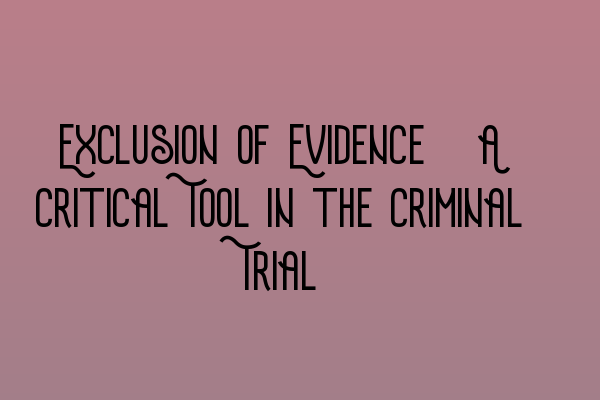Exclusion of Evidence: A Critical Tool in the Criminal Trial
Welcome to SQE Criminal Law & Practice Law UK, where we provide comprehensive insights into various aspects of criminal law. In today’s blog post, we will discuss the exclusion of evidence, which is a critical tool in the criminal trial process. Understanding the rules and principles surrounding the exclusion of evidence is essential for any criminal lawyer or practitioner.
Before diving into the details, let’s briefly define what we mean by the exclusion of evidence in a criminal trial. Simply put, it refers to the legal process through which certain pieces of evidence are declared inadmissible and cannot be presented before the court. This exclusion can happen for various reasons, including violations of the defendant’s rights, improper collection of evidence, or breaches of legal procedures.
The Role of Exclusion of Evidence
The exclusion of evidence plays a crucial role in maintaining a fair and just judicial system. By establishing rules for the admissibility of evidence, we ensure that only reliable and lawfully obtained evidence is considered in the criminal trial process. This serves to safeguard the rights of the accused and ensures that the trial proceeds on a level playing field.
One of the primary objectives of excluding evidence is to prevent the use of unlawfully obtained evidence, regardless of its probative value. This helps to deter law enforcement agencies or individuals from engaging in illegal practices and promotes a culture of respect for the rule of law.
Grounds for Exclusion
The exclusion of evidence can be based on various grounds, and the criteria for exclusion may vary depending on the jurisdiction. However, some common grounds include:
- Breach of the Defendant’s Rights: If evidence has been obtained through violations of the defendant’s constitutional rights, such as unlawful searches or coerced confessions, it may be excluded from the trial.
- Improper Collection Techniques: Evidence that has been obtained through questionable or illegal methods, such as tampering with evidence or planting, may also be excluded from the trial.
- Violations of Legal Procedures: If law enforcement officials fail to follow proper legal procedures during the collection or handling of evidence, it may be deemed inadmissible.
It is important for criminal lawyers and practitioners to thoroughly understand these grounds for exclusion and stay up-to-date with the latest legal developments in this field. This knowledge can help them effectively argue for the exclusion of evidence in court and protect the rights of their clients.
Impact on the Criminal Trial
The exclusion of evidence can significantly impact the outcome of a criminal trial. When crucial evidence is excluded, it may weaken the prosecution’s case, making it more challenging for them to establish guilt beyond a reasonable doubt. On the other hand, the exclusion of evidence can strengthen the defendant’s case and increase their chances of a favorable verdict.
As criminal lawyers and practitioners, it is important to assess the potential impact of excluded evidence and strategize accordingly. Skilfully arguing for the exclusion of evidence or challenging the admissibility of evidence presented by the prosecution can be a game-changer in a criminal trial.
Conclusion
The exclusion of evidence is a critical tool in the criminal trial process. It ensures fairness, upholds the rule of law, and protects the rights of the accused. Criminal lawyers and practitioners must be well-versed in the grounds for exclusion and master the art of presenting compelling arguments in court.
At SQE Criminal Law & Practice Law UK, we offer SQE 1 and SQE 2 preparation courses to equip aspiring solicitors with the skills and knowledge needed to excel in their legal careers. To assess your knowledge and practice for the SQE 1 exam, check out our SQE 1 Practice Exam Questions. Additionally, our SQE 1 Practice Mocks FLK1 FLK2 will help you familiarize yourself with the format and content of the exam.
If you’re preparing for the SQE 2 exam, our comprehensive SQE 2 Preparation Courses are designed to provide you with the necessary knowledge and practical skills required to excel in this assessment.
Stay updated with the latest SRA SQE Exam Dates by visiting our SRA SQE Exam Dates page.
Thank you for reading, and we hope you found this blog post informative! If you have any questions or require further assistance, please do not hesitate to reach out to the team at SQE Criminal Law & Practice Law UK.
